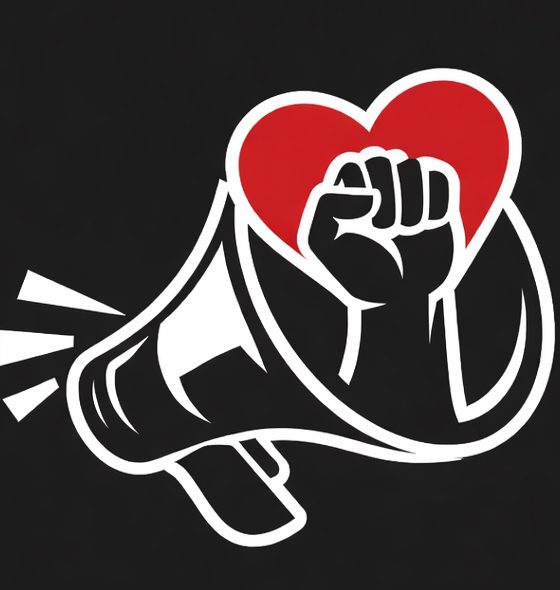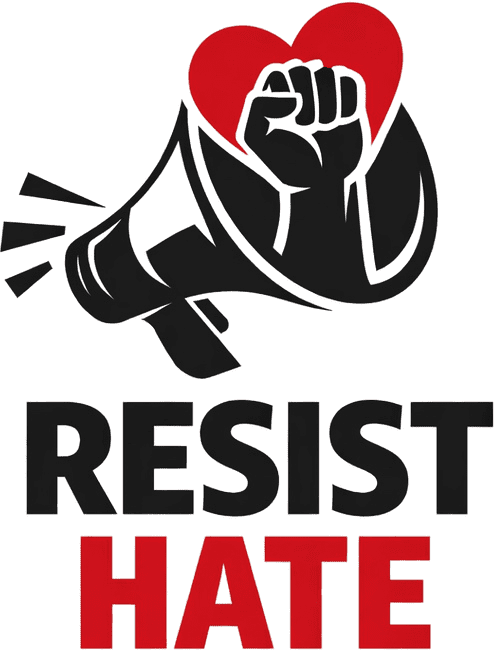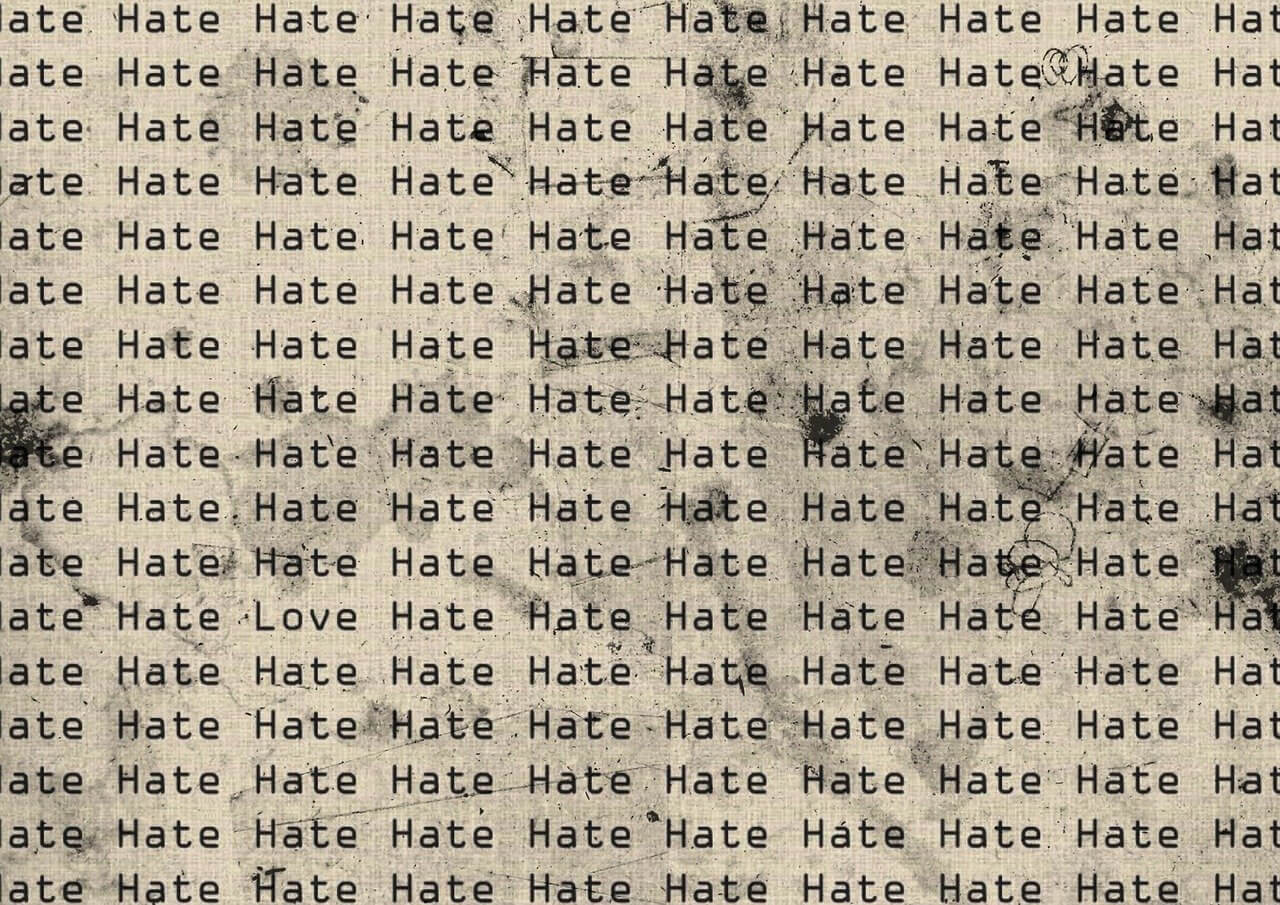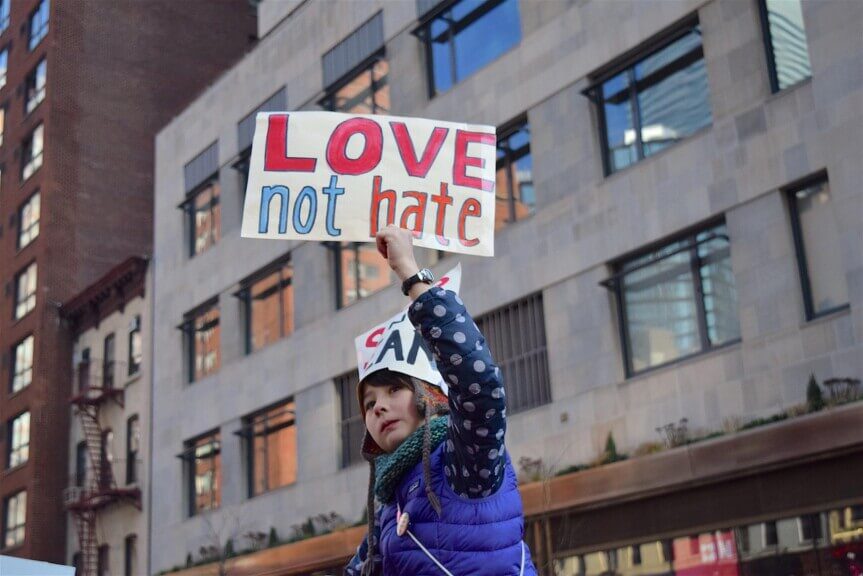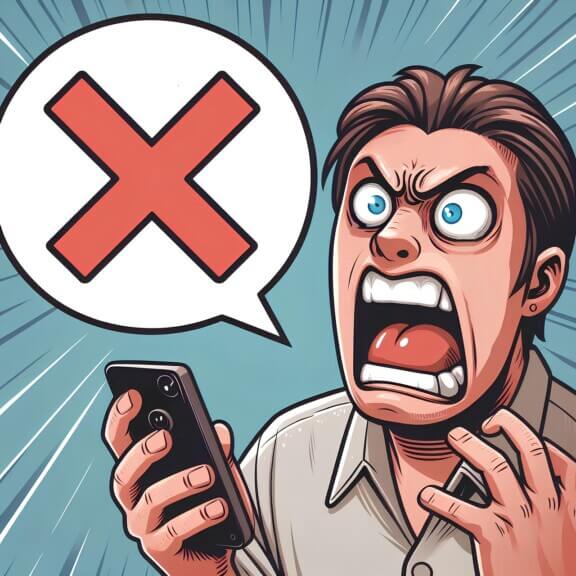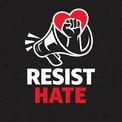Resist Hate was created to combat propaganda by sharing factual news and to combat hate with a Community of people who believe in our mission: “Making kindness the norm.” Pushing back against hate today is more difficult than it has been in the past.
More importantly, leadership is using hate and fear to control the population. Political violence is rising and members of the two major political parties view each other as “the enemy” rather than “an opponent.”
The President recently posted that several Democratic Representatives were engaged in “seditious behavior punishable by death.” He also shared a post from a user who suggested they be hanged.
They created a video reminding members of the U.S. Military about a current law that says they should refuse an illegal or unconstitutional order. Apparently, the people who live in an alternate reality now view sharing a fact to be treason (unless it’s in agreement with their beliefs).
Mass deportations have shown us how ugly hate and dehumanization can be. ICE and Border Patrol Officers have invaded towns and are causing mayhem and chaos as they brutalize and arrest anyone who’s brown—including U.S. citizens. Families are ripped apart, agents pulling crying children off their mothers as they’re being taken away from them. The videos and the stories are too much to bear for anyone with empathy for fellow human beings.
We won’t even get into the dehumanization we’re witnessing with the human rights abuses, torture, and violence that Palestinians are enduring as Israel commits a genocide in order to steal their land for the Greater Israel Project.
Anyone who has seen the images in their feeds knows what’s taking place in Gaza. The hatred involved is too complex and widespread for this article. You can view all of our content on the Israel/Palestine conflict in the Content Hub: People of Gaza.
Understanding the Roots of Hate
Hate is a complex phenomenon that often finds its roots in a variety of societal, cultural, and personal factors. To be effective in pushing back against hate, we must first understand why it exists. Hate isn’t just an emotion; it’s a belief system that can lead to harmful actions.
It can stem from misconceptions about different races, cultures, genders, and sexual orientations. When we explore the underlying reasons why people harbor such strong feelings of animosity, we begin to unravel the tangled web of hate.
Key Points
- Effective ways to educate others include organizing workshops, sharing resources online, and engaging in open discussions about race, gender, and sexual orientation.
- When speaking up against hate, it’s important to remain calm and assertive. Use “I” statements to express your feelings and encourage dialogue.
- There are numerous organizations dedicated to combatting hate, including the Southern Poverty Law Center, Human Rights Campaign, and the Anti-Defamation League.
- Promoting kindness can involve small actions like complimenting others, helping those in need, and organizing community service events.
- If you encounter hate speech online, consider reporting it to the platform, engaging in constructive dialogue if safe, or sharing resources that counteract the hate.
Why Do People Hate Certain Races?
Racial hatred is often born out of ignorance and fear. Many individuals may hold prejudiced views simply because they lack exposure to different cultures or people. Stereotypes can be perpetuated through family, community, or media, leading to a cycle of misunderstanding and intolerance.
When people are raised in environments that demonize certain races, they often adopt these views without question. These beliefs can be reinforced by socio-political narratives that pit groups against each other, further entrenching racial divides.
Additionally, personal experiences can shape an individual’s perspective on race. Negative encounters with individuals from a particular racial group can lead to broader generalizations about that entire group. This is where the concept of implicit bias comes into play, as people subconsciously associate certain traits or behaviors with specific races, often with little factual basis.
Understanding these dynamics is essential for activists trying to combat racism, as it highlights the importance of education and exposure in dismantling hate.
Why Do People Hate the LGBTQ+ Community?
Hatred toward the LGBTQ+ community often arises from deeply ingrained cultural norms and beliefs. Many people are raised with rigid definitions of gender and sexuality, leading them to view anything outside of these frameworks as threatening or immoral.
This perspective can be exacerbated by religious doctrines that condemn non-heteronormative identities. The lack of visibility and representation in mainstream media also contributes to this hate, creating a void that is often filled with fear and misconceptions.
Societal pressures can compel individuals to conform to these outdated beliefs, leading to a hostile environment for those who identify as LGBTQ+. Fear of the unknown—in this case, fear of different sexual orientations and gender identities—fuels discrimination.
This type of hatred is difficult to push back against when television, books, and movies often underrepresent the LGBTQ+ community. This is because when they do represent the community, people on the Right will get angry, boycott corporations, or ban books. It’s a no-win situation for them.
We need to do a better job at pushing back against their outrage and support the television shows, books, and movies that are doing the right thing by not discriminating against the community. Only then will it become normalized, and the response from the Right will eventually stop or shrink to a level that it goes unnoticed.
By recognizing that hate toward the LGBTQ+ community is often rooted in fear and misinformation, advocates can tailor their strategies to focus on visibility, education, and open dialogue to create a more inclusive environment.
The Impact of Fear and Ignorance
In both cases, the thread that weaves through the dislike of different races and the LGBTQ+ community is fear. Fear of losing power, fear of the unknown, and fear of difference can manifest as hate. This is particularly evident in times of social or economic strife, where individuals may look for scapegoats to blame for their troubles.
On the campaign trail in 2024, candidate Trump used immigrants as a scapegoat. He appealed to people who were angry about their current financial situation and blamed all of their problems on immigrants.
By understanding that these fears often stem from a lack of knowledge, activists can address the root causes of hate through education and awareness campaigns aimed at promoting empathy and understanding.
Ignorance plays a significant role in the perpetuation of hate. When individuals lack accurate information about a group or its members, they are more susceptible to believing harmful stereotypes and biases.
Combating ignorance is necessary in the fight against hate; through education, we can dismantle the false narratives that fuel animosity and promote a culture of understanding and acceptance. The emphasis on dialogue and learning can help bridge gaps and create a more harmonious society.
Where Does Hate Come From?
To tackle hate effectively, it’s important to dissect its sources. Hate doesn’t arise in a vacuum; it is a byproduct of various influences that shape beliefs and behaviors. By examining these influences, we can better strategize our response to hate and promote a more inclusive society.
Cultural Influences and Societal Norms
Cultural and societal norms are pivotal in shaping individuals’ beliefs. Many cultures have ingrained biases that dictate acceptable behavior and attitudes toward different groups. These norms can perpetuate stereotypes and foster environments where hate is tolerated or even encouraged.
For instance, societies that celebrate homogeneity may alienate individuals who are different, leading to systemic discrimination and violence against those who don’t conform.
societal structures such as laws and policies can either suppress or encourage hate. Historical injustices, such as segregation or discriminatory laws, can leave lasting scars that manifest as racial tension and intergroup conflict.
Understanding these societal frameworks helps activists identify where to focus their efforts, whether it’s advocating for policy change or creating grassroots movements that challenge cultural norms.
Personal Experiences and Backgrounds
Personal experiences play a significant role in shaping someone’s understanding of others. People who have faced trauma or hardship may develop biases as a defense mechanism. For example, someone who has been wronged by an individual from a particular group might generalize that experience to all members of that group.
These personal narratives can perpetuate cycles of hate and misunderstanding, as individuals become trapped in their perspectives without exposure to differing viewpoints.
Encouraging open dialogue about personal experiences can be a powerful tool in dismantling hate. When individuals share their stories and listen to others, they can challenge their preconceived notions and foster empathy.
Members: Share stories about hate you’ve experienced or witnessed on the Newsfeed (available only to members).
This exchange can break down the barriers of misunderstanding and create a platform for healing and reconciliation. Through initiatives that promote storytelling and shared experiences, communities can work towards overcoming personal biases and building a more inclusive society.
The Role of Media and Social Platforms
The media plays a major role in shaping public perception and attitudes toward various groups. Unfortunately, sensationalized reporting and biased narratives can perpetuate hate. When the media disproportionately highlights negative behaviors of a specific group, it can reinforce stereotypes and fuel discrimination.
Social media platforms (like X) often serve as echo chambers where hate can spread unchecked, allowing misinformation and prejudice to flourish.
As activists, it’s importantthat we hold media outlets accountable for the narratives they promote. Advocating for responsible reporting and representation can help mitigate the harmful effects of biased media coverage, pushing back against hate.
Leveraging social media for positive messaging and awareness campaigns can counterbalance the negativity often found online. By promoting uplifting stories and sharing accurate information, advocates can create a online communities that promote understanding and acceptance instead of hate. Pushing back against hate on one social media platform can be more difficult than others. X, formerly Twitter, has become known for an amount of hate, racism, and partisanship that you don’t find on other platforms.
Pushing back against hate on X wouldn’t be worth the time or effort. The owner of the platform and the users he promotes are generating income from the hate and division they promote. Nothing we do can change things—hate isn’t an honest emotion they’re feeling that we can replace with tolerance. It’s all an act to make money—sharing hateful rhetoric to followers who enjoy being hateful.
How to Push Back Against Hate
Pushing back against hate requires a concerted effort from individuals and communities alike. It’s not enough to simply denounce hate; we must actively work to combat it through education, advocacy, and support. Here are some effective strategies to make a difference.
1. Educating Yourself and Others
One of the most powerful tools in combating hate is education. By understanding the historical and cultural contexts of different groups, we can dismantle the ignorance that often fuels prejudice. Engaging in conversations about race, gender, and sexuality can help dispel myths and stereotypes, fostering a more informed community.
Sharing knowledge with others amplifies these efforts. Organizing workshops, discussions, or community events can create safe spaces for learning and dialogue. By encouraging open conversations, we can cultivate empathy and understanding, empowering individuals to stand against hate when they encounter it. Education should not be a one-time event but rather an ongoing commitment to learning and growth.
2. Speaking Up: Using Your Voice
Silence can be complicit in the face of hate. It’s important for individuals to use their voices to speak up against discrimination and injustice.
Whether it’s calling out racist jokes, challenging homophobic comments, or reporting hate speech online, every action counts. Speaking up can create ripple effects, encouraging others to join the fight against hate and fostering a culture of accountability. Courage is contagious!
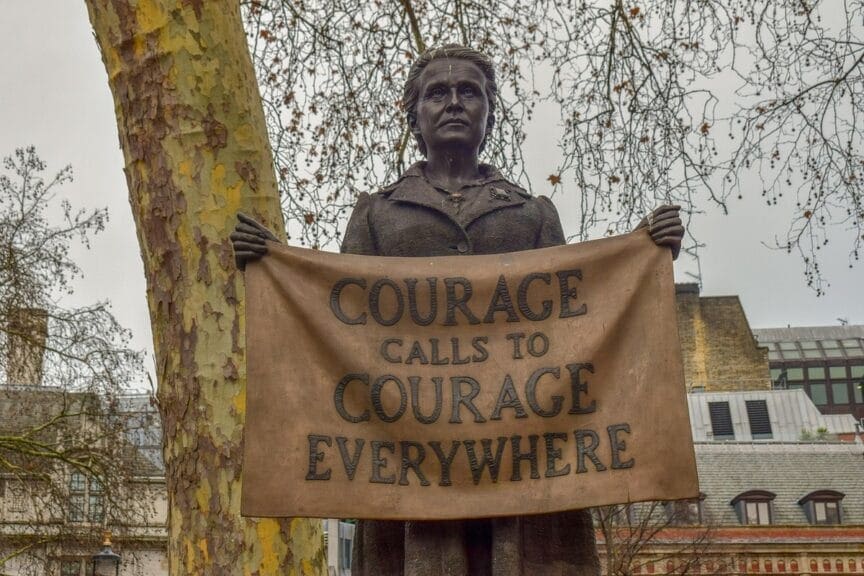
Leveraging platforms for advocacy can amplify our messages. Social media, blogs, and community forums are powerful tools for raising awareness and mobilizing support. Resist Hate is an example of an online community pushing back against hate. Membership is free.
By sharing personal stories, highlighting injustices, and promoting initiatives that combat hate, we can inspire action and create a united front against discrimination.
3. Support Organizations Combatting Hate
Many organizations are dedicated to combatting hate, and supporting these efforts can amplify our impact. Volunteering time, donating resources, or participating in fundraising events can help sustain initiatives that promote inclusivity and acceptance.
These organizations often provide valuable resources, educational materials, and community outreach programs that can make a tangible difference.
In addition to supporting established organizations, individuals can also create their own initiatives to address local issues. Community-based projects that focus on bringing diverse groups together can foster understanding and collaboration. By working together, we can build resilience against hate and create spaces where everyone feels welcome and valued.
Making Kindness the Norm Again
As we combat hate, we must also prioritize kindness and compassion. Creating a culture where kindness is celebrated can help counterbalance the negativity often prevalent in society. Here are some ways we can make kindness the norm again.
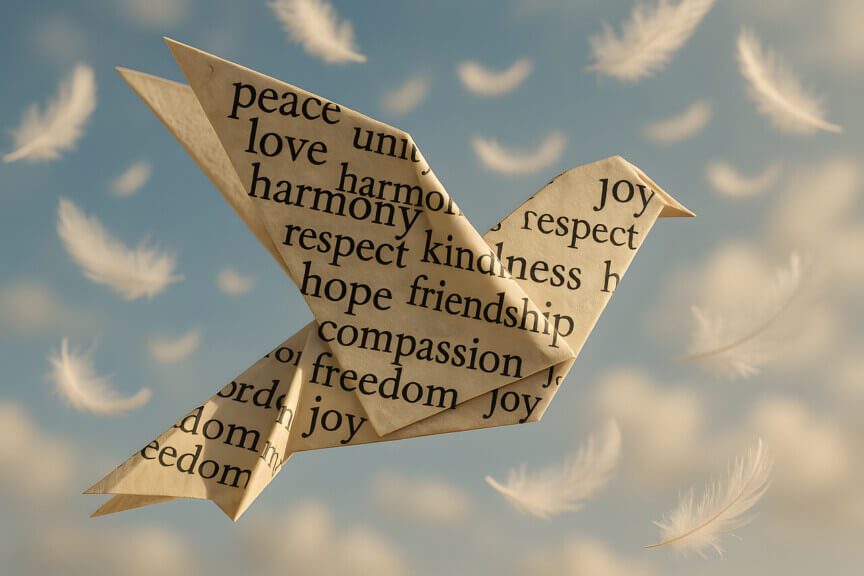
1. Practicing Empathy in Daily Life
Empathy is a powerful antidote to hate. By putting ourselves in others’ shoes, we can better understand their experiences and perspectives. Practicing empathy involves actively listening to others, validating their feelings, and showing compassion in our interactions.
This can be as simple as offering support to a friend in need or engaging in conversations with individuals from different backgrounds.
Cultivating empathy can extend beyond our immediate circles. Engaging with community members, attending cultural events, and participating in dialogues can broaden our understanding of the diverse experiences that exist within our society.
By fostering connections based on empathy, we can challenge the narratives of hate and create a more harmonious community.
2. Creating Inclusive Spaces
Creating inclusive spaces in our communities is vital in promoting acceptance and understanding. This can involve modifying existing environments to ensure they are welcoming to everyone, regardless of their background or identity.
Whether it’s a workplace, school, or community center, actively working to dismantle barriers and promote inclusivity can make a significant difference.
In addition to physical spaces, enabling an inclusive culture is equally important. Encouraging diverse voices in decision-making processes and ensuring representation in leadership roles can help create an environment where everyone feels valued and heard.
This commitment to inclusivity can cultivate a sense of belonging and significantly reduce feelings of hate and division within communities.
3. Celebrating Diversity Through Community Events
Community events are a fantastic way to celebrate diversity and promote understanding. Organizing festivals, workshops, and cultural exchanges can create opportunities for individuals to learn about and appreciate different cultures and identities.
These events also provide a platform for marginalized voices to share their stories and contributions, promoting a sense of pride and community.
Involving local organizations, artists, and community members in event planning can ensure that diverse perspectives are represented.
By actively promoting cultural awareness and celebrating differences, we can create an environment where kindness and acceptance flourish, ultimately pushing back against hate and empowering unity.
Final Thoughts
Hate is a multifaceted issue that requires a comprehensive response from individuals and communities. By understanding its roots, addressing its sources, and actively pushing back against it, we can create a culture of kindness, acceptance, and empathy.
Education, advocacy, and support are essential in dismantling the narratives of hate and building a more inclusive society. Together, we can promote understanding and compassion, ultimately leading to a world where diversity is celebrated and hate has no place.
FAQs
What are some effective ways to educate others about hate and tolerance?
Effective ways to educate others include organizing workshops, sharing resources online, and engaging in open discussions about race, gender, and sexual orientation. Storytelling can also be a powerful tool to highlight personal experiences and foster empathy.
How can I speak up against hate without escalating the situation?
When speaking up against hate, it’s important to remain calm and assertive. Use “I” statements to express your feelings and encourage dialogue. Focus on promoting understanding rather than confrontation to defuse tensions.
What organizations can I support in the fight against hate?
There are numerous organizations dedicated to combatting hate, including the Southern Poverty Law Center, Human Rights Campaign, and the Anti-Defamation League. Research local organizations as well to find community-specific initiatives that align with your values.
How can I promote kindness in my community?
Promoting kindness can involve small actions like complimenting others, helping those in need, and organizing community service events. Encourage local initiatives that celebrate diversity and foster a sense of belonging.
What should I do if I encounter hate speech online?
If you encounter hate speech online, consider reporting it to the platform, engaging in constructive dialogue if safe, or sharing resources that counteract the hate. It’s important to prioritize your safety while addressing the issue.
